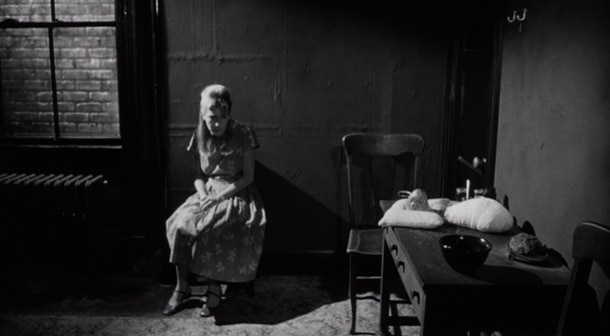
For many people, Eraserhead is an arty, confusing, and horrific film. They find it difficult to watch, and are just generally repulsed by the entire affair.
So perhaps it’s no wonder that after 37 years, the film is still a cinematic mystery. There is no general agreement about what it all means. The film has become highly influential —launching David Lynch’s career and the phrase “Lynchian”—but yet it remains a great unsolved puzzle.
Recently, I’ve realized that Eraserhead has a profound and positive message. It’s a message many people can relate to and which has the potential to resonate powerfully within their own lives.
Sound crazy? Yes. But stay with me.
Many people believe that Eraserhead is primarily about the anxiety of becoming a parent. Specifically, they believe that the film depicts a fear of fatherhood and the responsibilities that role entails. And they are right, to a certain extent—the film most definitely raises those issues.
But in a recent interview, David Lynch states that, to date, no one has come up with his interpretation of Eraserhead. While there are many theories about the film, none of them reflect his personal vision for it. Therefore, the film must be more than an exploration of the horrors of child-rearing. Lynch’s true intention remains a mystery.
I believe that’s because Lynch has hidden his clues very well in the film.
Eraserhead, it seems to me, is largely about fear and the effect that emotion has on the mind. I think the film shows how we can confront fear, destroy it, and embrace bliss.
My reasoning:
David Lynch’s surreal films are filled with abstractions, symbols, and codes. And his films are intensely psychological. This is especially true of Eraserhead. David Lynch describes the film as “A dream of dark and troubling things.” I would emphasize the word “dream” in this synopsis. I believe the film takes place entirely within the mind and that everything we see represents the way Henry’s mind works.
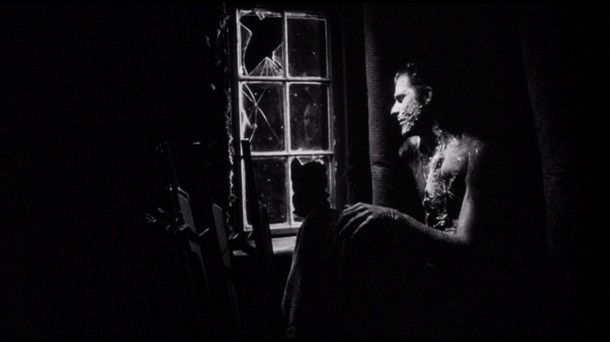
The film opens with a puzzling sequence. While Henry’s head floats in space, a strange, deformed character called The Man in the Planet stares out a window and pulls some levers, causing a weird creature to come out of Henry’s mouth, a puddle to appear, and the creature to splash into it. It is then birthed into Henry’s world. It is a creature which looks very much like the Baby that Henry stabs at the horrific climax of the film.
In Eraserhead, the Baby drives Henry’s wife away. It keeps him trapped in his room. Henry fears that it will replace him. It stops him from pursuing an affair with his beautiful neighbor. It mocks him.
So Henry stabs it and kills it.
This is why many people find Eraserhead too terrible to watch.
But what is this creature, the Baby, and why was it created?
From the opening sequence we know that The Man in the Planet lives in a shack with a puddle of some sort outside of it. He stares out of a window. Henry appears to scream and The Man in the Planet reacts to something he sees outside. But we don’t know exactly what it is. We just know that afterwards he pulls the levers, creating the creature.
We don’t find out what he was reacting to until late in the film.
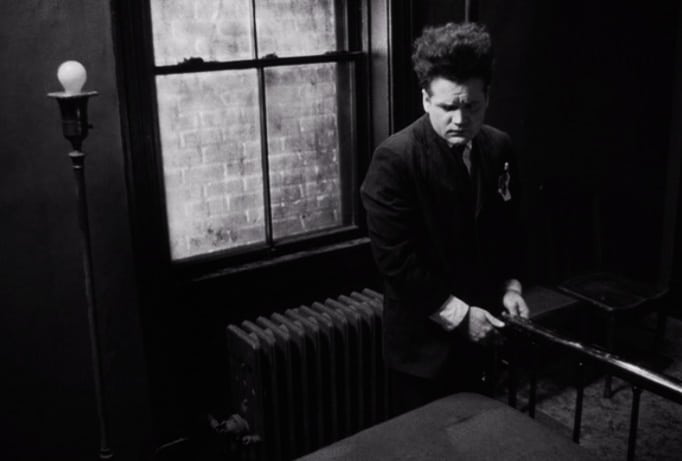
Throughout the movie, we are repeatedly shown ominous shots of a window in Henry’s apartment. It appears to have paper bricks plastered on the outer glass of the window.
At the beginning of the third act, the bricks seem to disappear and Henry finally looks out the window. He sees an assault in the street by a puddle.
If the movie takes place within Henry’s mind, then the bricks represent an attempt to repress something. When the bricks are take away, we see what was hidden behind them.
So when Henry kills the Baby, what is he actually killing? Does the Baby perhaps represent something else?
I believe that Henry is killing the fear within his mind when he kills the Baby.
David Lynch has repeatedly stated that Eraserhead is his Philadelphia Story. And for him, Philadelphia was a place of fear.
Fear, and therefore the Baby, was created by witnessing a violent assault in the street. The Baby’s “parents” are the violent act and Henry’s reaction to it. Throughout the film Henry represses the true source of his fear.
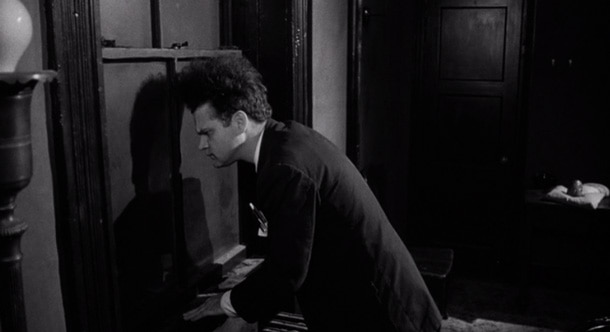
After the Baby is stabbed, a strange white substance begins to ooze from its organs, engulfing its body. Its head tries to escape from it.
That substance is very similar to the substance on The Lady in the Radiator’s cheeks. The Lady in the Radiator is a source of comfort to Henry. She smiles and stomps on creatures that look like the Baby. Therefore, she destroys fear, as Henry would like to do. Her power, and the white substance, emanates from her smile. It is a source of bliss.
Once Henry faces fear in the climax, he sees it for what it truly is—a dark planet. It begins to blow apart, and The Man in the Planet is eventually overcome by the same substance as the Lady in the Radiator’s cheeks. Henry then embraces bliss, literally.
Therefore, the film is ultimately about confronting fear, destroying it, and embracing bliss. A powerful and inspiring message for anyone who, like Henry, lives in a world of fear—you can get out of it.
I’ve written a lengthy analysis of Eraserhead, describing my journey with the film and how I arrived at my interpretation. I’ve also included an annotated script, which I created by watching the film and transcribing what I saw. You can read my Eraserhead essay and script transcription here.







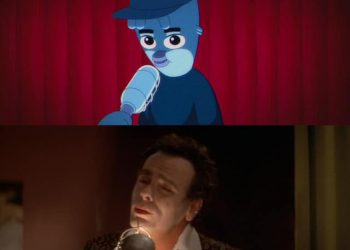




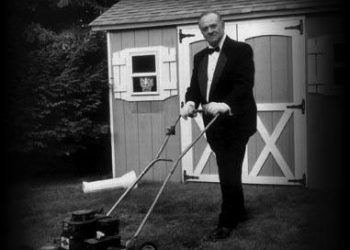
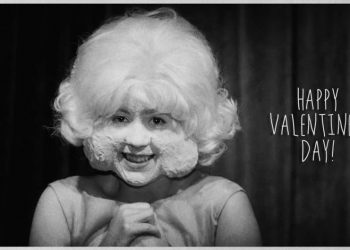

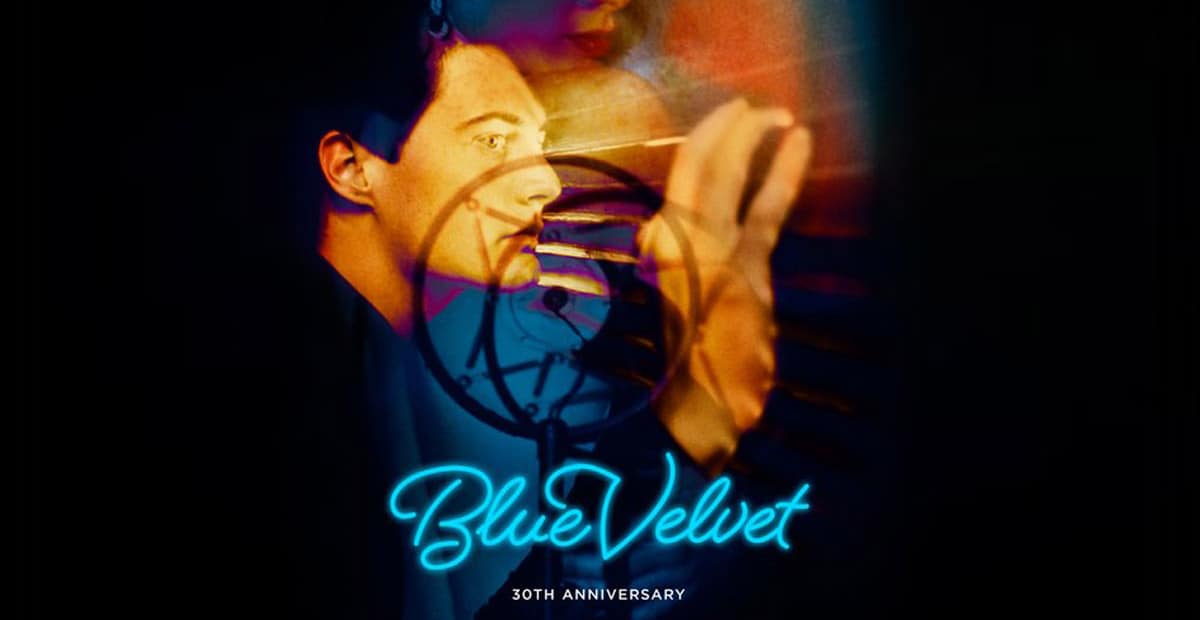

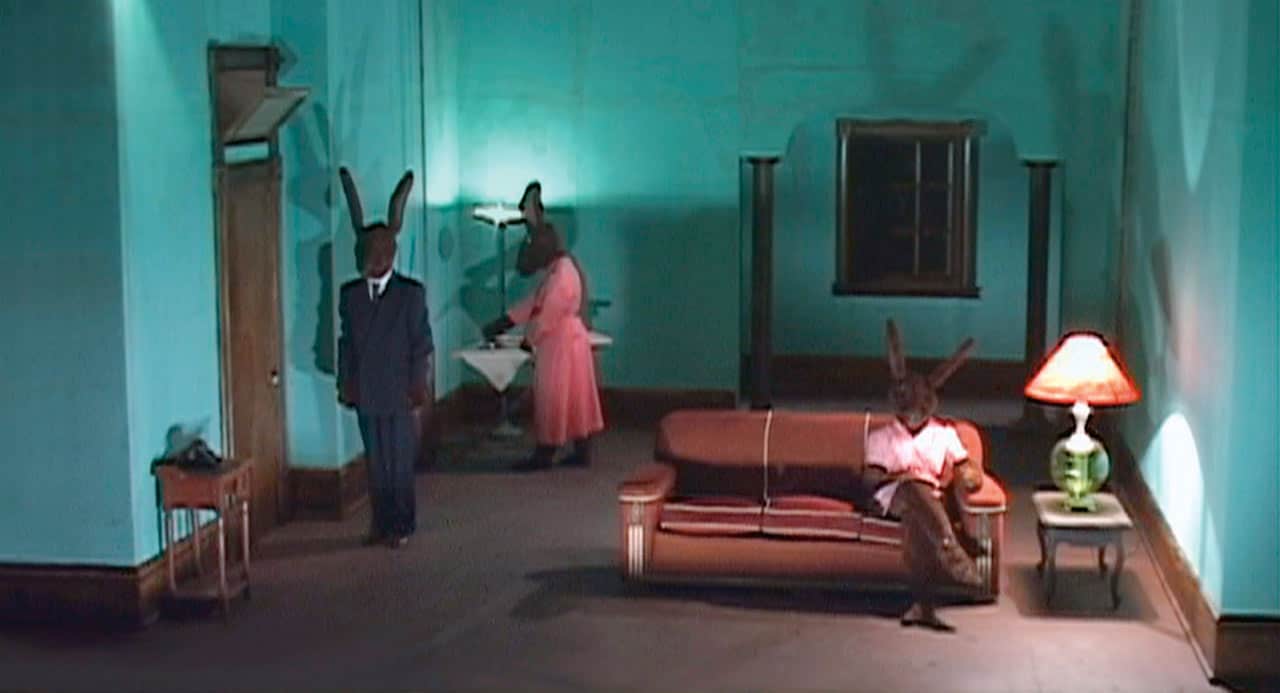
Fear IS the mind killer.
And I agree. I look forward to reading your analysis of the Lady in the Radiator scene.
Yep, and this: “It’s not so bad, as long as you can keep the fear from your mind,” Agent Cooper to Diane as he lies on the floor, shot and bleeding, in Episode 8 (May the Giant Be with You).
I talk about The Lady in the Radiator scenes in the “Breaking the Code” and annotated script sections of the longer essay linked in the article above. Here’s the direct link:
https://cinematicdetective.wordpress.com/2014/11/04/turning-the-nightmare-into-a-dream-eraserhead-revisited-2/
the baby is life . Life is horrific. Only dreams can make life bearable.
Excellent article!! I’ll be delving into the essay and transcript soon, after rewatching the film.
I had the same deep realization. Dreams defy our punishing reality, with it’s limits and boundaries. Without dreams we would be the victims of our own fear and fear is fueled by the prison cell of rationality. Dreams defy logic and defy reason which allows bliss within our tortured struggle to survive and maintain our civilized facade.
I do not believe the Lady in the Radiator is a source of joy for Henry. I believe he is profoundly confused by her. Look at his expression when the smiley lady approaches him. He’s expressionless, almost confused. Her cheeks are exaggerated into a smile — as if she’s a little girl. She’s a dancer — as if she’s a little girl! She hugs him, she wants to love her Daddy. I believe the radiator lady is the baby grown up as a small child. She has a naive and magnetic attraction to Dad, as if he’s some sort of hero, but it was really the Man in the Planet (his sexuality) that caused birth to her. He knows he is no hero, just profoundly confused by this smiling, vibrant little girl (who will grow to be like her mother, and we saw her mother and her mother’s mother earlier when Henry is invited over for dinner, and we know how they turned out). I think the movie is about the horror of sexuality and procreation.
Interesting. I’ve felt exactly the same thing when I’ve watched the movie for the second time, years after the first viewing.
I have trouble picturing the lady in the radiator in an other part than young woman that could become the baby. It’s quite obvious to me.
I’ve read a lot of comments. And which is even more obvious is that everyone is giving his interpretation. The only one that makes people answer : “wrong”, is yours. Weird when you thing about it cause I’m not sure there is a right one. There is one for each spectator, otherwise the movie would be less mysterious and easier to explain.
It makes me think of the freud’s concept of resistance.
Resistance, in psychoanalysis, refers to oppositional behavior when an individual’s unconscious defenses of the ego are threatened by an external source.
At first, everyone was shouting Freud’s madness. Which was a proof it was actually provoking an emotion.
Same for your comment..! 😉
Wrong.
Super wrong, agreed.
The lady in the radiator is the enemy, offering a false promise that: “in heaven everything is fine”, suggesting that God has no place in this world, that he turns his back because it’s not in his backyard. It is here that the viewer needs to disentangle themselves and realize what Lynch is doing. Morality is our personal view of the world, and it is important not to take unjustified leaps. Lynch, in the eyes of the protagonist, presents our world’s hope for a true and just God, but there is little in religion to substantiate this claim. Christian/Greek/RomanMayan/Hindu etc. gods and goddesses were usually at war, usually demonstrating the folly of man in creating such beings in man’s own likeness. Lynch presents the unknown alien, Lynch says, here are the limits of your own understanding that you can’t be at peace with.You used to be fine with a dead dog playing with it as if it were alive, playing God, well here you are now! That’s not bliss, that’s a lack of memory, and a lack of care in carrying one meaning and applying it the same way in the same situation, a lack of grammar/editing, and it may very well happen again when we don’t know the same rules and use the same rules.
Hmm, I thought the Man in the Planet represented the child all grown up. Especially when the baby got a similar-looking skin condition the moment Henry turned away. I thought it was interesting that Henry was actually quite accepting and caring for the baby, especially in the beginning (when he was smiling as he observed his wife feeding it, and also, when he wouldn’t leave the child’s side when it cried). So I assumed the Baby would grow into the Man in the Planet. Thus, I was surprised he took the baby’s life in that moment of frustration. But you know what maybe that’s what it was, a moment of frustration. He clearly felt really bad. And you know what, it’s also possible he didn’t actually kill the child. And it’s also very possible that the form of the child was not real, and actually represents his fear of a worst-case scenario as opposed to the actual child. Cause it seemed like he was stuck in a dream inside of a dream inside of a dream, etc… Speaking of which, the Lady in the Radiator was also from his inner mind. Perhaps she literally represents a source of warmth in a world that is so cold. Those little gross intestine-like things she was first avoiding and then squishing seemed to represent the queasy feeling one gets in their gut when dealing with anxiety. But yes, if this is about the horrors and heavy responsibilities involved in parenthood, well David Lynch finished making this film as a young man (31), actually not that young. It’s very possible his views or anxiety about parenthood have changed or evolved as he has gotten older.
I personally did not really like the film, but it is interesting to think about. I feel there’s two equally valid ways of looking at life. From a dreadful existentialist point of view or from a point of view that, yes life is tough, but there are beautiful things in this world, and if not, we can create them. I think this article helped soften my opinion about the movie. I didn’t even notice the window clearing up at the end. I guess, definitely more to think about. I would love if people decided to do a piece on the Man in the Planet, because I find myself wanting to know more about exactly what part he plays in this film.
*Also, there was a part where he patted the baby’s head, which was actually an endearing moment in the film. So while I did not like that he “killed” the child at the end, I don’t think he hated the child (even judging by his reaction), but it bought a lot of inconveniences for him, I suppose, or perhaps he thought the situation was hopeless, when he cut open the rags and saw the baby’s extreme condition.
My take has always been that the lady in the radiator is in heaven (where everything is fine). Henry can’t have real love or intimacy with his wife and longs to have it with the lady in the radiator. He tries to touch her but he can’t. She turns into a scolding bright light, untouchable. I don’t believe it was henry’s intention to kill his baby. I believe he just tried to cut the swaddling off of it not realizing he was cutting into the baby. It is then that the baby’s REAL father appears. After the real father of the baby kills Henry can Henry be with the lady in the radiator.
I honestly can’t believe you think this is such an incredibly rare and novel interpretation. You don’t read very much, if so.
The organ thrust out of Henry is very similar to the lymbic system, or the part of the brain that processes our emotions. I wouldn’t call the baby fear, but rather pure emotion that was shown the world and it discovers how cold and evil it is and is therefore consumed by fear. In order to shelter himself from this absolute terror and damage, he “bricks up” his mind, so I definitely concur with your point about the bricks outside the window. I don’t believe the baby is really his baby, but rather a symbol of his damaged emotional self. His wife/girlfriend falls in love with his repressed, bricked up calloused self that can manage the evils of the world, but when she sees his true damaged self, when she hears the baby cry, she reconsiders who she though she knew and herself is terrified and leaves. She is vulnerable, and put trust in him, and his true inner weakness scares her off. Him reaching out for her acceptance in bed and her rejection is what I believe makes the baby cry. It’s what makes him deep down feel the pain of rejection. I see the lady in the radiator as the spirit of women who receive the sacred gift of a man’s love by the dozen, and are overjoyed by these gifts but through sheer magnitude and availability lose value for it, hence why the lady in the radiator stepped on a few lymbic systems as though nothing happened. Henry is at the mercy of his lovers, and sees how casually his neighbor lover tosses him aside. His raw emotion comes out, and he’s consumed by terror from what he sees. This is evident when he loses his bricked up head and the baby, consumed by terror, comes out. To me it’s the story of a man deeply traumatized and coping with his sexuality.
We see Henry’s head sitting right IN FRONT of the planet. We see that the man in the planet controls this birth of emotional fear in Henry’s day to day life. Then towards the end of the film right when he is confronting his fear and acknowledging it (he cuts the bandages to see the baby for what it really is), after the baby approaches him and the lights go out we see a whole blow through the planet. Henry looks awe struck. Eraser shavings floating around his head. The man in the planet can not control the levers that control Henry any longer. Is the man in the planet a symbol for Henry’s egoic mind and patterns? That’s my view.
Wow what an amount of conflicting interpretations. To me, however, certain things are very clear about the movie.
– The guy with the levers is an ugly god. That Henry got the baby was an act of an ugly god pulling a lever, which means a random unplanned and unfortunate coincidence.
– The worms represent semen and his manhood. Ugly god pull lever -> semen goes into egg, baby is born. Classic.
– The baby is ugly cos he doesn’t accept it.
– The girl behind the radiator is an image of his wife that he is trying to accept. She is promising that in heaven things are fine… means: “Do the right thing, get married, be happy in the marriage, get into heaven”. Henry deep down knows his responsibility is to accept his role as a father. Just he has suppressed his emotion and just pretending he is OK with it because it’s a shotgun wedding by the parents. So for him, everything is fine, just a small issue is that the woman looking at her is as ugly as the baby.
– The girl in the radiator is squashing worms = stepping on his manhood. His manhood wants to be free, screw the neighbor girl etc… but “the right thing to do” looks ugly and is laughing at him and squashing his manhood.
– He has a vision in which he sees his head is made of eraser. This means his head is just full of a wish to erase what happened: to erase the mistake with the baby. He is not ready to accept his parenthood but is absolutely just trying to escape it.
– He makes a desperate attempt to escape ugly parenthood again and goes for another take on his loose neighbor woman. But this time he is ridiculed by the fact that the she already had another man. Single life hurts, and he realises that that’s not what he wants either. At this point a clear vision strikes him that he is the baby himself. It is he who is the ugly baby, refusing to take his responsibility and acting childish instead.
– In desperation, he decides to open the baby’s wrapping to see what it actually is: to solve the mystery of why everything in his life is so ugly. Remember, the baby is himself.
– After he has opened the baby (opened himself), we see the solid rock breaking open. The solid rock surface is now open wide.
– After this, the darkness of the movie turns white and Henry is seen embracing his wife. He has broken the rock and stopped escaping the parenthood via realising that he is only disgusted at himself. The nightmare is over.
The entire film is a metaphor for David Lynch having felt trapped in a world as a father he didn’t want to be.
The baby is Henry’s genitals.
Mary is ill equipped to handle them because she is an immature child woman.
The “lady in the radiator” is the dream of sexual gratification. Her face is ovaries.
The man in the planet is Henry’s release.
Henry is trapped by his sexual desire and the fear of the repercussions of unwanted pregnancy.
When he has the vasectomy he is worried that his organ won’t work anymore but those fears are allayed when the baby is solid and bigger and more virile than before.
The Man in the Planet is trying to force sperm from the machine but, obviously, post vasectomy, he can’t release them.
The Lady in the radiator (all women and their ovaries) embrace Henry with warm acceptance.
Henry’s face in the final shot is calm and serene. He will never have to worry about being a father ever again.
When Lynch and Peggy got married in 1967 she was already pregnant and he took a job he hated as a printer.
It’s a pretty simple movie that everyone puts bigger concepts on top of.
Sorry. Sadly you did not get it either. Lynch is not going to overtly tell us what it’s about so leaning into—it’s about “fear” because he says it is not cutting it. Too easy. He’s playing with you and taking you down a wrong path intentionally. I know what it’s about and I’m not telling because I’ve never won an Emmy and I’m not getting paid to blog it. Try again.